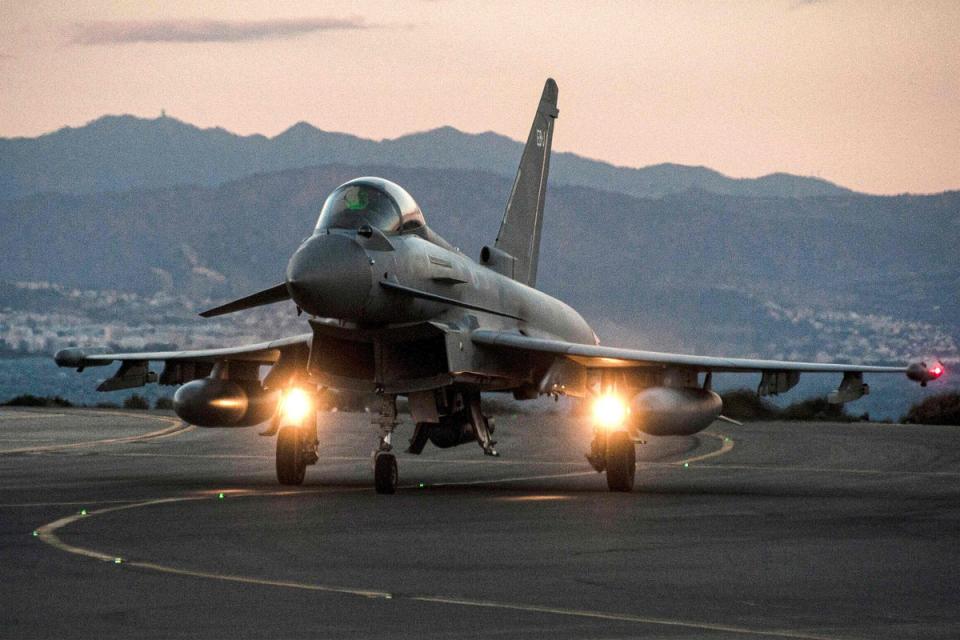UK defence and foreign secretaries in Turkey to talk war and weapons ahead of Nato summit

Weapons and war were the top agenda items in a pair of high-powered diplomatic meetings between the UK and Turkey on Thursday.
The visits by the UK’s foreign and defence secretaries to Ankara followed news of the possible collapse of a major fighter jet deal between Ankara and Washington and came amid a crisis in Nato over efforts to include Nordic countries in the alliance.
Defence secretary Ben Wallace met his counterpart Hulusi Akar in the Turkish capital. Ahead of a summit in Madrid next Wednesday, Nato allies are seeking to convince Turkey to remove its opposition to allowing Sweden and Finland to join the alliance.
They hope to present a united front against Russia as it pursues its four-month war in Ukraine.
Likely topics of discussion included a proposal to build fighter engines by Turkey and UK’s BAE Systems, possible construction of a Turkish aircraft carrier modelled on the Queen Elizabeth and sales of the Eurofighter Typhoon warplane.
“The defence secretary is meeting his counterpart in Turkey today for routine bilateral talks on cooperation and security issues ahead of the Nato summit next week,” a Ministry of Defence spokesperson said in an email.
Foreign secretary Liz Truss also flew to Turkey to meet senior officials, including foreign minister Melut Cavusoglu, to discuss defence industry cooperation as well as Ukraine, the Nato summit and the ongoing conflict in Syria, according to Turkish officials.
The visits by the UK officials come at a time of frenetic diplomacy centred on Ankara.
Saudi crown prince Mohammed bin Salman visited Turkey on Wednesday. Israel’s foreign minister and future premier Yair Lapid made a hurried trip to Ankara for a long-scheduled visit, even amid a government crisis in Tel Aviv. The visit came just hours after Turkish security forces arrested a number of purported Iranian operatives allegedly planning to harm or kill Israelis visiting Turkey.
The Russian attack on Ukraine has transformed the balance of power in Eurasia, disrupting trade routes and energy supply lines as well as security assumptions. The years-long attempt by the US to step back from its dominant role in the Middle East has also prompted regional countries to confer and bolster ties.
Talks about the possible sale to Turks of the Typhoon heated up as the US Congress appeared set to throw a spanner into plans to supply the Nato member with F-16 fighter jets. Lobbied by Armenian and Greek players and angered by Turkey’s opposition to Nato enlargement, US lawmakers have voiced concerns about selling advanced weapons to Turkey.
Ankara was also removed from the programme to receive next-generation F-35 warplanes after it insisted on purchasing Russian S-400 anti-aircraft technology in violation of American restrictions.
Prime minister Boris Johnson phoned Turkish president Recep Tayyip Erdogan on Tuesday to discuss “cooperation in the defence industry”, as well as the Ukraine war, and the visits by the top officials came soon after.

Turkey’s main Arab ally, Qatar, has forged a £5bn deal to purchase the Typhoons, which are produced by a consortium that includes the UK, Germany, Spain and Italy. Each fighter jet has an export price tag of about £100m.
Turkey says it opposes the drive to allow Sweden and Finland quickly into Nato because of Stockholm’s sympathy for Kurdish separatist organisations and groups that Ankara sees as major security threats.
Earlier this month, Turks were outraged after Kurdish activists in Sweden projected images of the group’s jailed leader, Abdullah Ocalan, and logos of the Kurdistan Workers Party (PKK) onto government buildings, in what Turks deemed tacit official support for the outlawed militant group.

